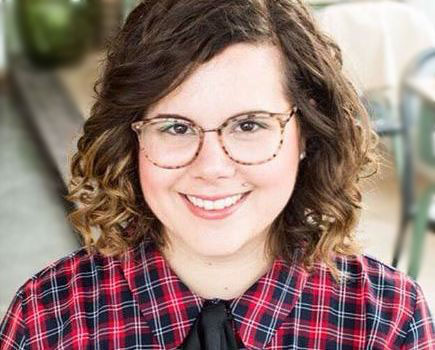“It was at INRS that I had the privilege of diving head first into the fascinating world of research. This experience really crystallized my desire to continue in this avenue and gave me the confidence to be creative with my ideas and the boldness to do research differently, despite the challenges it may bring. I accept this award with great humility and gratitude and I thank the exceptional mentors at INRS that I continue to work with.”
Élyse Caron-Beaudoin
Doctorate in biology, 2018
Centre Armand-Frappier Santé Biotechnologie research centre
2022 Prix Lumières Awardee • Firestarter Category
Assistant Professor in environmental health
Department of Health and Society
University of Toronto Scarborough
Watch her video message [in French]
Why did you choose to study at INRS?
After a master’s degree in ecotoxicology, which involved mostly field work, I wanted to focus on the field of toxicology applied to human and environmental health. I was looking for an environment that would allow me to develop my skills in the laboratory and to devote most of my time to research.
What do you remember about your experience at INRS?
The generosity of my fellow students who dedicated a lot of time and energy to teaching me the basics of cell culture and several molecular biology techniques: I had done very little of this before starting my PhD! As the lab was shared between Thomas Sanderson’s and Cathy Vaillancourt’s teams, there was a really nice gang of students! It was also at that time that I met several women professors who acted as my mentors and who greatly encouraged and inspired me. I also remember the great independence I enjoyed during my PhD, which certainly helped shape my own research program in the years that followed.
Do you have a favorite memory from campus?
A hallmark of the Centre Armand-Frappier Santé Biotechnologie was (and probably still is!) the wide array of activities organized by students and staff. The spirit of camaraderie between the different research teams and the passion of each one towards their research projects made the Centre a really nice place to work.
One of my fondest memories is probably my participation in the Bioscience Apprenticeship. This week-long program allows teenagers to immerse themselves in the world of research by being paired with a Master’s or PhD student at INRS.
What is the most important lesson you have learned from your time at INRS?
There are many, but I would say that one of the most important lessons for me was to develop my autonomy as a researcher and to be bold in my research ideas. When I shared my ideas with my supervisor, other professors or students, the discussion was always enriching and caring.
Tell us about your journey since graduation
Towards the end of my thesis, I began working on another research project regarding exposure to environmental contaminants associated with natural gas development in northeastern British Columbia. This pilot project allowed me to obtain a postdoctoral fellowship in environmental and occupational health at the Université de Montréal. I had the opportunity to develop skills in environmental epidemiology by studying the associations between density and proximity of natural gas wells and their effect on births.
In my opinion, environmental toxicology and epidemiology are two complementary disciplines and it was my experience at INRS, and then during my postdoctoral fellowship, that really allowed me to combine these expertises in different research projects in health and environmental justice.
In July 2020, I obtained an assistant professor position at the University of Toronto. My lab develops projects in partnership with communities to assess the impacts of anthropogenic pressures such as contaminant exposure on health and well-being. To better understand these effects, we use an ecosystemic approach combining information on several levels of biological organization.
How did your time at INRS prepare you for your career?
Because I had a lot of independence during my thesis, I developed skills in project management, data collection, writing scientific articles and communication. All of these experiences have prepared me well for my role as a professor, both in terms of developing new research projects and supervising interns and graduate students.
What advice would you like to give to current students?
Trust yourself! You are the experts in your research project and you have a lot to contribute to your field. Don’t be afraid to be bold and come up with ideas. And finally, it’s easy to feel overwhelmed while studying, so take care of yourself.
What are your wishes for the future?
I would like to see the development of environmental policies based on the precautionary principle and the observations of communities most affected by environmental disruptions. I also hope to see more of my scientific colleagues join forces with communities to positively influence toxic substance regulations in participatory research projects that have real potential to understand the links between social, environmental and biological determinants of health.

